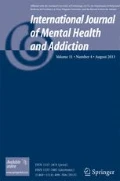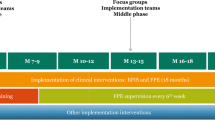Abstract
Ethical viewpoints about the correct course of action in a clinical situation can vary across individuals. The views of patients and their caregivers are also important considerations while exploring solutions to ethical dilemmas. This study aimed to ascertain the perspectives of patients and caregivers on ethical issues in mental health care. This vignette-based study included patients with psychiatric disorders and their caregivers. Patients were included if they were in clinical remission determined by psychiatric rating scales. Caregivers were included if they resided with the patient for the last 1 year. Both patients and caregivers were in the adult age group. The vignettes pertained to confidentiality and coercive care and elicited a yes or no type of responses. Ten short vignettes were presented to the patient caregiver dyad. The types of responses and agreement between the patients and their caregivers were assessed. Responses were available from 160 dyads of patients and their caregivers. The mean age of the patients was 35.6 years while that of the caregivers was 40.5 years. A slight majority of the patients and caregivers were males and were educated above high school. There was considerable variation in the views about correct course in a particular clinical situation. The responses from patients and caregivers endorsing disclosure of confidential information or coercive treatment varied from about 50% to more than 90% depending upon the clinical situation. The responses of patients generally had a fair agreement with responses of the caregivers (kappa values largely between 0.21 and 0.40). Viewpoints of patients and their caregivers provide an important stakeholder insight in approach to resolving ethical dilemmas. In the present cultural context, patients and caregivers were amenable to disclosure of confidential information in for a variety of clinical situations.
Similar content being viewed by others
References
Avasthi, A. (2010). Preserve and strengthen family to promote mental health. Indian Journal of Psychiatry, 52(2), 113–126. https://doi.org/10.4103/0019-5545.64582.
Bayer, R., & Toomey, K. E. (1992). HIV prevention and the two faces of partner notification. American Journal of Public Health, 82(8), 1158–1164.
Butler, M. H., Rodriguez, M. K. A., Roper, S. O., & Feinauer, L. L. (2010). Infidelity secrets in couple therapy: therapists’ views on the collision of competing ethics around relationship-relevant secrets. Sexual Addiction & Compulsivity, 17(2), 82–105.
Carman, D., & Britten, N. (1995). Confidentiality of medical records: the patient’s perspective. The British Journal of General Practice: The Journal of the Royal College of General Practitioners, 45(398), 485–488.
Elder, R., Price, J., & Williams, G. (2003). Differences in ethical attitudes between registered nurses and medical students. Nursing Ethics, 10(2), 149–161.
Elliott, A. C. (2001). Health care ethics: cultural relativity of autonomy. Journal of Transcultural Nursing: Official Journal of the Transcultural Nursing Society, 12(4), 326–330.
Garbutt, G., & Davies, P. (2011). Should the practice of medicine be a deontological or utilitarian enterprise? Journal of Medical Ethics, 37(5), 267–270. https://doi.org/10.1136/jme.2010.036111.
Hamilton, M. (1960). A rating scale for depression. Journal of Neurology, Neurosurgery, and Psychiatry, 23, 56–62.
Jenkins, G., Merz, J. F., & Sankar, P. (2005). A qualitative study of women’s views on medical confidentiality. Journal of Medical Ethics, 31(9), 499–504. https://doi.org/10.1136/jme.2004.010280.
Kramer, M. S., & Feinstein, A. R. (1981). Clinical biostatistics: LIV. The biostatistics of concordance. Clinical Pharmacology & Therapeutics, 29(1), 111–123.
Kuo, F. C. (2009). Secrets or no secrets: confidentiality in couple therapy. The American Journal of Family Therapy, 37(5), 351–354.
Makoae, M. G., & Jubber, K. (2008). Confidentiality or continuity? Family caregivers’ experiences with care for HIV/AIDS patients in home-based care in Lesotho. SAHARA J: Journal of Social Aspects of HIV/AIDS Research Alliance, 5(1), 36–46.
Mobeireek, A. F., Al-Kassimi, F., Al-Zahrani, K., Al-Shimemeri, A., Al-Damegh, S., Al-Amoudi, O., et al. (2008). Information disclosure and decision-making: the Middle East versus the Far East and the West. Journal of Medical Ethics, 34(4), 225–229. https://doi.org/10.1136/jme.2006.019638.
Oberle, K., & Hughes, D. (2001). Doctors’ and nurses’ perceptions of ethical problems in end-of-life decisions. Journal of Advanced Nursing, 33(6), 707–715.
Overall, J. E., & Gorham, D. R. (1962). The brief psychiatric rating scale. Psychological Reports, 10(3), 799–812.
Pérez-Cárceles, M. D., Pereñiguez, J. E., Osuna, E., & Luna, A. (2005). Balancing confidentiality and the information provided to families of patients in primary care. Journal of Medical Ethics, 31(9), 531–535. https://doi.org/10.1136/jme.2004.010157.
Prinsen, E. J. D., & Van Delden, J. J. M. (2009). Can we justify eliminating coercive measures in psychiatry? Journal of Medical Ethics, 35(1), 69–73.
Rahman, N. (1996). Caregivers’ sensitivity to conflict: The use of the vignette methodology. Journal of Elder Abuse & Neglect, 8(1), 35–47.
Simone, S. J., & Fulero, S. M. (2001). Psychologists’ perceptions of their duty to protect uninformed sex partners of HIV-positive clients. Behavioral Sciences & the Law, 19(3), 423–436.
Sjöstrand, M., & Helgesson, G. (2008). Coercive treatment and autonomy in psychiatry. Bioethics, 22(2), 113–120.
Tanaka, G., Inadomi, H., Kikuchi, Y., & Ohta, Y. (2005). Evaluating community attitudes to people with schizophrenia and mental disorders using a case vignette method. Psychiatry and Clinical Neurosciences, 59(1), 96–101.
Willison, D. J., Emerson, C., Szala-Meneok, K. V., Gibson, E., Schwartz, L., Weisbaum, K. M., et al. (2008). Access to medical records for research purposes: varying perceptions across research ethics boards. Journal of Medical Ethics, 34(4), 308–314. https://doi.org/10.1136/jme.2006.020032.
Young, R. C., Biggs, J. T., Ziegler, V. E., & Meyer, D. A. (1978). A rating scale for mania: reliability, validity and sensitivity. The British Journal of Psychiatry: the Journal of Mental Science, 133, 429–435.
Author information
Authors and Affiliations
Corresponding author
Ethics declarations
All procedures followed were in accordance with the ethical standards of the responsible committee on human experimentation (institutional and national) and with the Helsinki Declaration of 1975, as revised in 2000 (5). Informed consent was obtained from all patients for being included in the study.
Conflict of Interest
The authors declare that they have no conflict of interest.
Electronic supplementary material
ESM 1
(PDF 222 kb).
Rights and permissions
About this article
Cite this article
Sarkar, S., Patra, B.N., Patil, V. et al. Patient and Caregiver Perspectives on Ethical Issues in Mental Health Care: an Exploratory Study from India. Int J Ment Health Addiction 16, 714–721 (2018). https://doi.org/10.1007/s11469-017-9833-0
Published:
Issue Date:
DOI: https://doi.org/10.1007/s11469-017-9833-0



